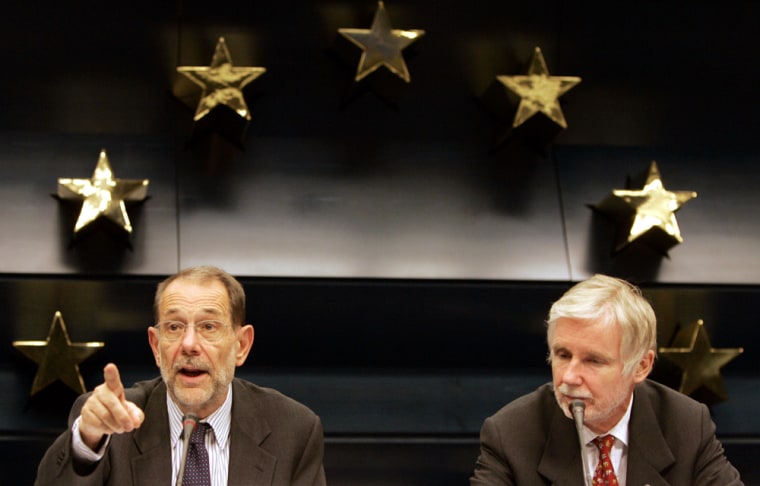European Union foreign ministers called on Tuesday for an immediate end to hostilities in Lebanon but dropped a demand for an instant cease-fire at the insistence of the United States’ closest allies in the bloc.
A statement adopted at a rare August crisis meeting of the 25-nation EU said: “The Council calls for an immediate cessation of hostilities to be followed by a sustainable cease-fire.”
The convoluted formula emerged from four hours of talks as Israel intensified attacks on Hezbollah guerrillas and vowed to step up ground operations, defying calls to halt an onslaught sparked by the seizure of two Israeli soldiers on July 12.
An initial draft proposed by the EU’s Finnish presidency had said flatly: “The Council called for an immediate cease-fire.”
But Britain, backed by Germany, the Czech Republic, Poland and Denmark, insisted on the alternative wording and unanimity is required for EU foreign policy statements.
‘No divisions’
Finnish Foreign Minister Erkki Tuomioja, who chaired the talks, denied the bloc was split and said the meaning was the same: “There are no divisions in the EU ... This means there will be no shooting, no killing. There is no difference.”
French Foreign Minister Philippe Douste-Blazy said the idea of a phased halt to the fighting corresponded to a draft U.N. Security Council resolution that Paris has circulated.
That proposes a framework for an end to fighting, principles of a political settlement, a permanent cease-fire and the deployment of an international stabilization force.
“Once this framework has been established, EU member states have indicated their readiness to contribute to such an operation together with international partners,” ministers said.
EU members France, Italy, Finland, Poland, Sweden and Spain are all considering sending peacekeepers to Lebanon. EU candidate Turkey and Muslim Asian state Indonesia have also said they may provide troops if there is a peace to keep.
Italian Foreign Minister Massimo D’Alema told reporters: “We risk that if the war continues, at the end deployment of the force becomes impossible because we need an agreement with the Lebanese government, with the other countries in the region.”
EU condemns Hezbollah, Israel
Finland’s Tuomioja said Israel’s decision to step up the war against Hezbollah was unacceptable, unlikely to succeed and would only fuel support for Middle East extremists.
The EU condemned Hezbollah rocket attacks on Israel and the death of innocent civilians in Sunday’s Israeli air strike on the Lebanese village of Qana.
Britain has stuck closely to the U.S. line that a cease-fire must be “sustainable” — seen by critics as a green light for Israel to go on bombing Hezbollah.
British Foreign Secretary Margaret Beckett disputed any such interpretation, telling a news conference: “I would be surprised and dismayed if someone were to try to read that into today’s conclusions ... which explicitly call on all parties, all participants, to cease hostilities, to cease violence.”
Sidestepping some issues
The Europeans sidestepped the issue of how to disarm Hezbollah, the Middle East’s best armed guerrilla movement, which has resisted U.N. resolutions calling for the disarmament of all militias in Lebanon.
Instead the EU sought to engage Hezbollah’s regional backers — both in the West’s bad books — to help resolve the crisis.
Douste-Blazy said Iran, Hezbollah’s chief arms supplier, could play a responsible role after he met Tehran’s foreign minister in Beirut on Monday.
EU foreign policy chief Javier Solana said Spanish Foreign Minister Miguel Angel Moratinos would visit Syria, Hezbollah’s other key ally, to work for a solution.
Tuomioja said now was no time for the EU to consider placing Hezbollah on its list of outlawed terrorist organizations, “given the sensitive situation”. The EU, which has blacklisted the Palestinian militant group Hamas, has repeatedly resisted U.S. and Israeli pressure to do the same to Hezbollah.
